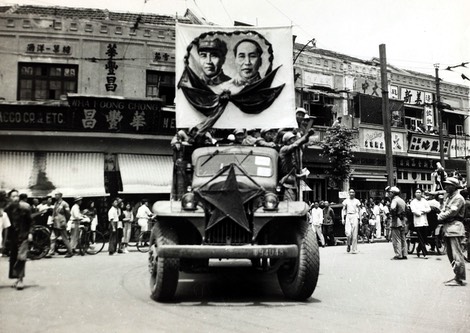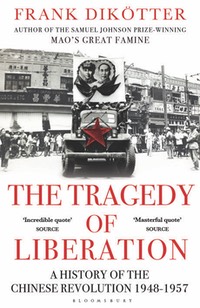The Sunday Times, 1 September 2013
The word for liberation in Chinese is jiefang. You see it everywhere there, in street names, or on the masthead of the Shanghai newspaper the Liberation Daily. The word is part of the foundation myth of the modern Chinese state, but this groundbreaking book examines the bloodstained reality behind the word and reveals how it brought tragedy to millions.
Frank Dikotter is already the author of a revelatory book about China’s great famine of 1958-62, and in this prequel — unsparing in its detail, relentless in its research, unforgiving in its judgments — he deals in the same way with the Chinese revolution from 1945 to 1957. This was a vital period in the country’s development, which saw the communist victory over the nationalist forces of Chiang Kai-shek in the civil war and the end of the old order in China. It led to the industrialising Great Leap Forward of 1958-61, the great famine of the same period and the cruel anarchy of the Cultural Revolution of the 1960s. This exhaustive trawl through Chinese archives charts the full cost of those early years of change.
Dikotter begins his book in 1948, at the siege of Changchun, a godforsaken city in northeast China where the communist general Lin Biao trapped the nationalist army and local population inside the city walls for 150 days. The fall of Changchun turned the tide in the conflict, but it cost the lives of 160,000 civilians, many of whom starved to death. One local communist army officer wrote that the siege “was like Hiroshima”.
Despite such ruthlessness, heady optimism gripped millions of Chinese in 1949 when Mao Tse-tung proclaimed the establishment of the People’s Republic. Mao, however, swiftly betrayed those hopes. A bamboo curtain fell across the country as foreigners were expelled. In the countryside “the world turned upside down” as gentry and landlords were murdered en masse. One by one, newspapers, publishers, writers and intellectuals were stifled.
Then, in 1950, Mao led China into another war, in Korea. About 800,000 Chinese “volunteers” died, including Mao’s own son, but he used the conflict to regiment the nation through mass campaigns and labour camps.
Dikotter borrows Robert Conquest’s phrase from Soviet history, “the Great Terror”, to describe the mass killings that accompanied these policies. “Like steel production or grain output, death came with a quota,” he declares, before calculating the numbers killed on Mao’s direct orders: some 45,000 people, for example, in the province of Hubei alone.
One mass murderer whom Dikotter focuses on is Deng Xiaoping, later hailed as the reformer of China, and the subject of a respectful biography by Ezra Vogel. It is worth tracing Dikotter’s indictment of this cold individual in detail.
In the 1940s Deng ran the “land reform” programme in Anhui province. As he himself explained, “The masses hated several landlords…so we followed their wishes and killed them… The masses feared reprisals, so they drew up an even longer list of names… Again we followed their wishes and killed these people.” The slaughter did little good, though: “We kept on killing and the masses kept on feeling more and more insecure.”
On April 21, 1951, the head of Sichuan province suggested that 6,000 landlords be paraded and executed. Dikotter has found Deng’s endorsement of this report in the party committee archives of the west Sichuan region. He also found a document recording Mao’s approval of a proposal by Deng to execute between half and two thirds of all counter-revolutionaries; fine, said Mao, as long as it was “secretly controlled, without disorder or mistakes”.
Cruelty, superstition and quotas often converged amid the shock of change. In southwest China lepers were buried alive. Some were burnt at the stake. In Yunnan, cadres decided that lepers created “a bad impression on the masses”, so they locked 110 of them in the local hospital and set it on fire. Only four survived. I wouldn’t have believed this if I had read it in a CIA Cold War propaganda leaflet, but check the footnotes, there it is, recorded in the party’s own “internal reference” bulletin for May 1953.
If some of the names sound familiar, it is because they are. Xi Zhongxun, father of China’s present leader Xi Jinping, ran the anti-corruption campaign in northwest China. Bo Yibo, father of Xi Jinping’s jailed rival Bo Xilai, ran the campaign against tainted officials in Beijing.
Dikotter’s achievement in this book is remarkable. He has mastered a mass of original source material, and has done so by mining local archives in China, which have yielded up a host of treasures. (Significantly, scholars are now reporting the steady closure of official records, as local bureaucrats revert to old habits of secrecy and isolation. This may be the last work of its kind for a while.)
If The Tragedy of Liberation has a weakness, though, it is that the staggering amount of detail sometimes becomes overwhelming. The concluding chapters, too, seem to run out of steam, and huge themes, such as the end of Stalinism, are sometimes examined only in brief.
But this does not detract from Dikotter’s achievement (he is already working on a third book, on the Cultural Revolution). For many years, histories of China have treated the 1950s as if the decade was an interlude of reason. That belief does not survive contact with this book. “It is first and foremost a history of calculated terror and systematic violence,” Dikotter states, one that saw the deaths, he calculates, of some 5m people.
Maoist historians, of course, would label all this “revisionist”. The party’s apologists, however — useful idiots such as the sinologist Joseph Needham and calculating hypocrites such as the novelist and historian Han Suyin — are long discredited. But it is clear to this reviewer, at least, that mainstream academic scholarship must also be revised in the light of Dikotter’s work. In particular, volume 14 of the Cambridge History of China, which covers the period of this book, will have to be rewritten.

